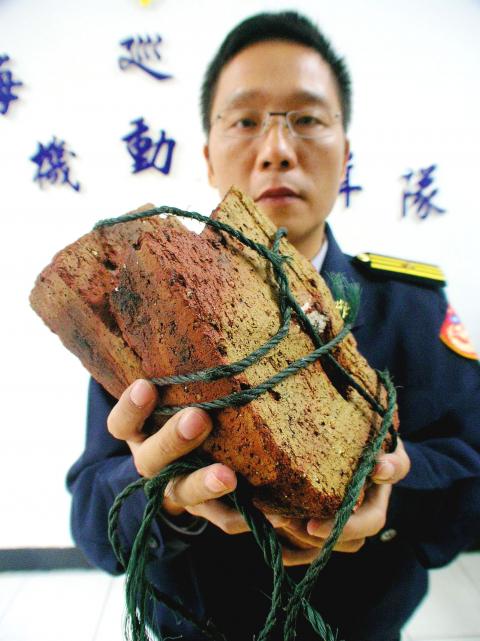Two Taiwanese coast guard officers and three Chinese fishermen from Xiamen were injured in a clash yesterday morning when a coast guard patrol tried to stop a Chinese fishing boat from poaching in Taiwan’s territorial waters off the outlying islet of Little Kinmen (小金門).
The incident quickly escalated into a standoff between three Taiwanese coast guard patrol vessels and 28 Chinese fishing boats.
It started when a fishing boat from China was spotted at about 1:30am yesterday, fishing illegally in Taiwan’s territorial waters off Little Kinmen — an islet west of the main island of Kinmen, close to China’s southeastern coast.

PHOTO: WU CHENG-TING, TAIPEI TIMES
A cutter from the Coast Guard Administration’s Kinmen unit intercepted the fishing boat and two coast guard officers went aboard in an attempt to inspect it, but they were attacked by the Xiamen fishermen with stones and bamboo poles.
The two officers sustained injuries to the head and ribs and three Chinese fishermen were also hurt.
The Kinmen patrol cutter called for backup and two other coast guard boats rushed to the scene. The Chinese fishermen were arrested and the wounded were taken to hospital for treatment.
One of the three injured fishermen was rushed to the hospital on the main island of Kinmen for treatment, while three others were taken to the coast guard’s Kinmen Office for questioning.
However, during the clash, the Xiamen fishing boat also radioed for assistance and drew a response from 28 other Chinese fishing boats with more than 80 people aboard.
The fishing vessels converged on Little Kinmen’s Luocuo Fishing Port (羅厝漁港), where they staged a stand-off with the coastguard patrol.
The Chinese men on the fishing vessels shouted at the coast guard, demanding the release of the Xiamen fishermen who had been arrested.
Su Sheng-chin (蘇勝欽), deputy chief of the Kinmen unit of the coast guard, went to the port and succeeded in calming the Chinese fishermen after many hours. The 28 boats left Luocuo Fishing Port at 7am.

A Chinese aircraft carrier group entered Japan’s economic waters over the weekend, before exiting to conduct drills involving fighter jets, the Japanese Ministry of Defense said yesterday. The Liaoning aircraft carrier, two missile destroyers and one fast combat supply ship sailed about 300km southwest of Japan’s easternmost island of Minamitori on Saturday, a ministry statement said. It was the first time a Chinese aircraft carrier had entered that part of Japan’s exclusive economic zone (EEZ), a ministry spokesman said. “We think the Chinese military is trying to improve its operational capability and ability to conduct operations in distant areas,” the spokesman said. China’s growing

Taiwan yesterday denied Chinese allegations that its military was behind a cyberattack on a technology company in Guangzhou, after city authorities issued warrants for 20 suspects. The Guangzhou Municipal Public Security Bureau earlier yesterday issued warrants for 20 people it identified as members of the Information, Communications and Electronic Force Command (ICEFCOM). The bureau alleged they were behind a May 20 cyberattack targeting the backend system of a self-service facility at the company. “ICEFCOM, under Taiwan’s ruling Democratic Progressive Party, directed the illegal attack,” the warrant says. The bureau placed a bounty of 10,000 yuan (US$1,392) on each of the 20 people named in

Nine retired generals from Taiwan, Japan and the US have been invited to participate in a tabletop exercise hosted by the Taipei School of Economics and Political Science Foundation tomorrow and Wednesday that simulates a potential Chinese invasion of Taiwan in 2030, the foundation said yesterday. The five retired Taiwanese generals would include retired admiral Lee Hsi-min (李喜明), joined by retired US Navy admiral Michael Mullen and former chief of staff of the Japan Self-Defense Forces general Shigeru Iwasaki, it said. The simulation aims to offer strategic insights into regional security and peace in the Taiwan Strait, it added. Foundation chair Huang Huang-hsiung

PUBLIC WARNING: The two students had been tricked into going to Hong Kong for a ‘high-paying’ job, which sent them to a scam center in Cambodia Police warned the public not to trust job advertisements touting high pay abroad following the return of two college students over the weekend who had been trafficked and forced to work at a cyberscam center in Cambodia. The two victims, surnamed Lee (李), 18, and Lin (林), 19, were interviewed by police after landing in Taiwan on Saturday. Taichung’s Chingshui Police Precinct said in a statement yesterday that the two students are good friends, and Lin had suspended her studies after seeing the ad promising good pay to work in Hong Kong. Lee’s grandfather on Thursday reported to police that Lee had sent